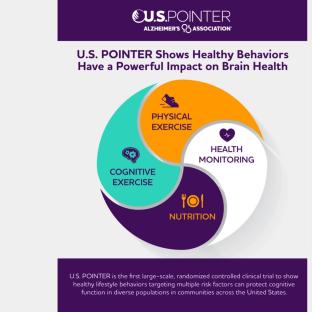On 28 July, an international group of researchers published an article on the cognitive effects of lifestyle interventions in older adults in The Journal of the American Medical Association (JAMA) and presented their findings at the Alzheimer’s Association International Conference (AAIC). The two-year U.S. POINTER trial found that a structured programme of physical exercise, dietary changes, cognitive and social stimulation, and cardiovascular monitoring led to significantly greater improvements in global cognitive function than a lower-intensity, self-guided version. The structured group’s global cognitive composite score increased on average by 0.243 standard deviations (SD) per year, compared to 0.213 SD per year in the self-guided group. The randomised trial included 2,111 participants aged 60–79 at risk of cognitive decline due to sedentary lifestyles and other risk factors.
Participants were assigned to either a structured or a self-guided group, both focusing on the same five lifestyle goals but differing in intensity, supervision and accountability. The structured intervention had a consistent effect in participants regardless of APOE ε4 status and showed a greater benefit in people with lower baseline cognitive scores. Serious and non-serious adverse events were slightly less frequent in the structured group. The study confirms that higher-intensity, structured lifestyle changes can produce greater improvements in cognition than self-directed efforts. Long-term follow-up and biomarker analysis will be important to determine clinical relevance and sustainability. The article has been published open access and can be read here: https://jamanetwork.com/journals/jama/fullarticle/2837046
